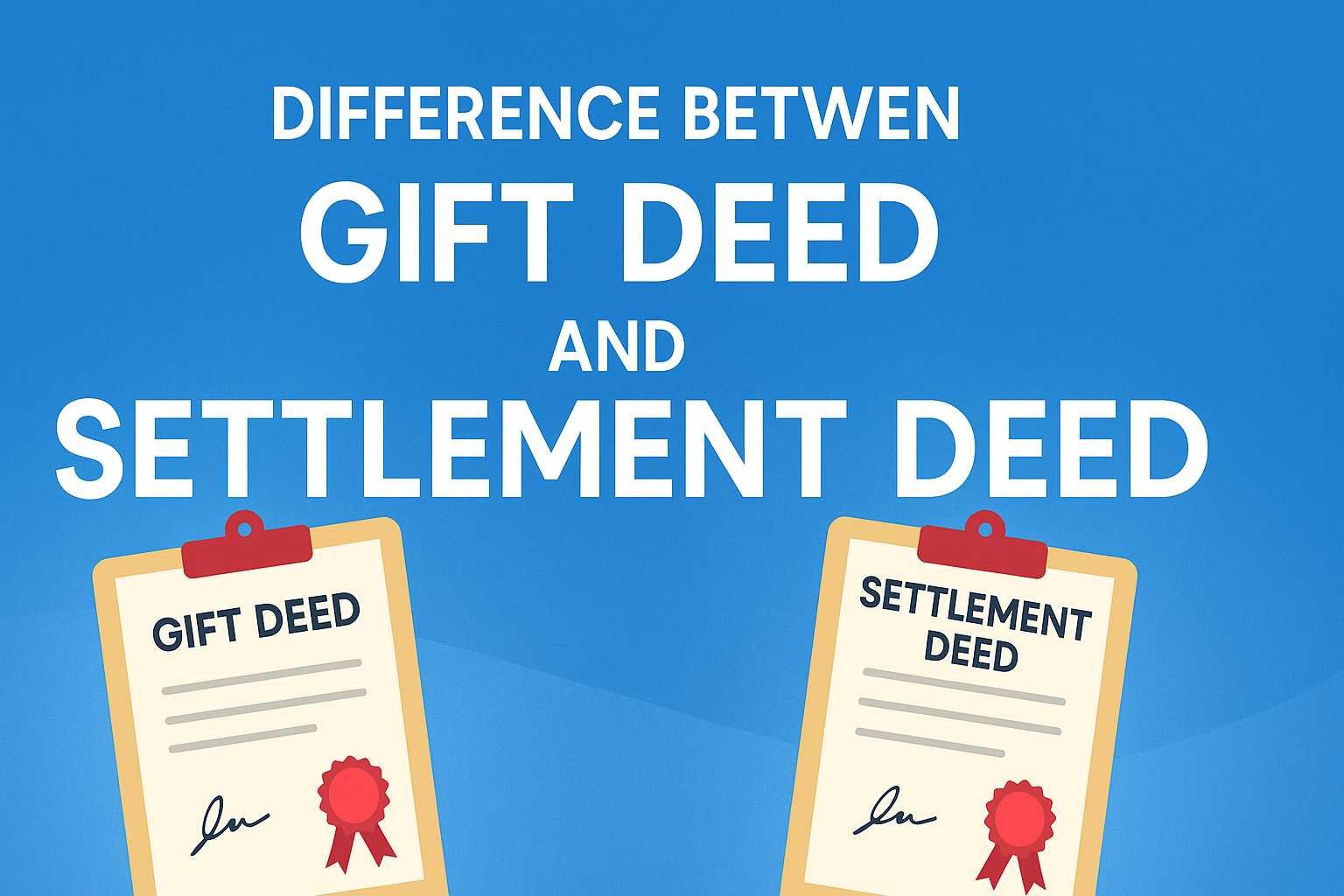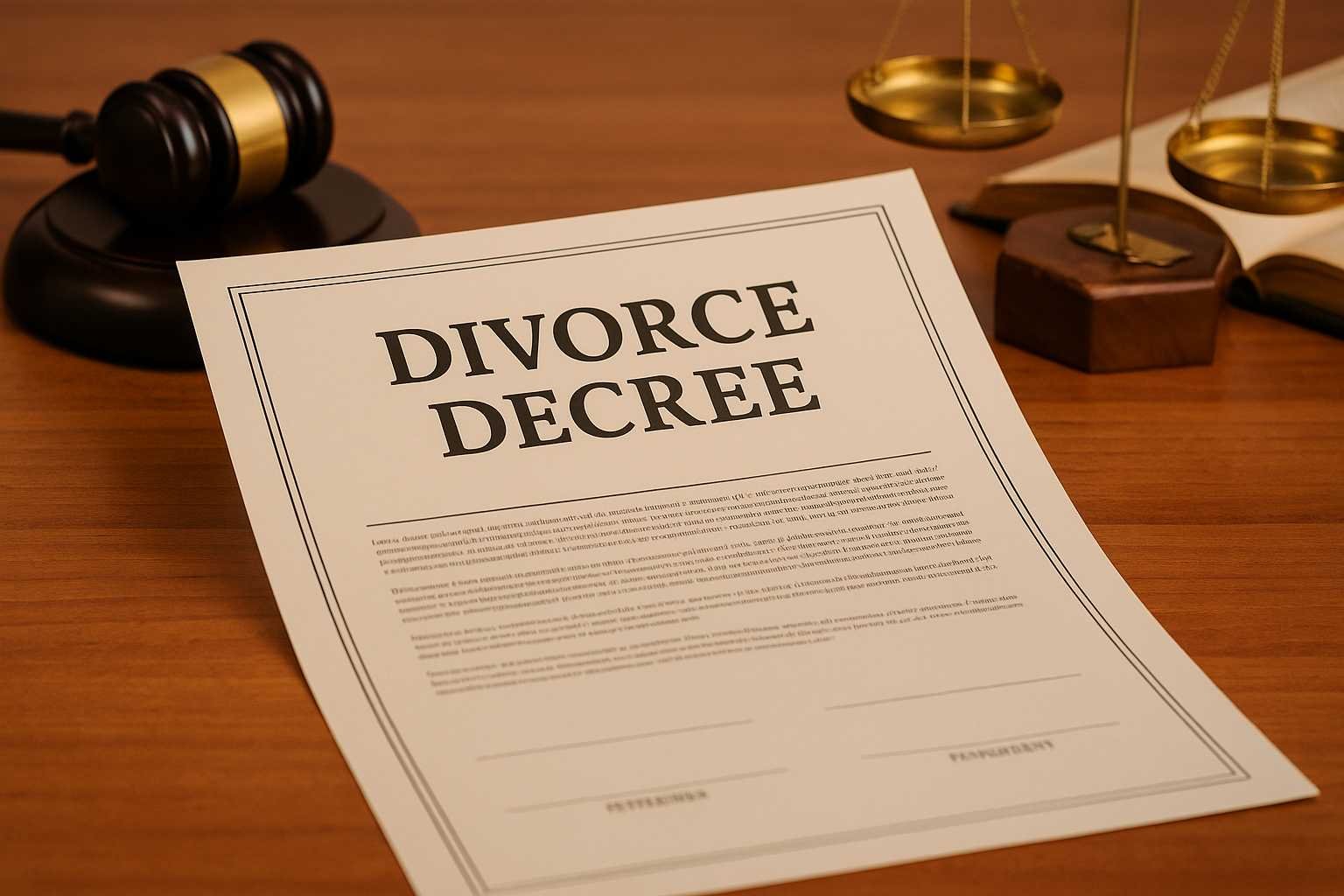On this page you will read detailed information about Difference Between Gift Deed and Settlement Deed
Property transfer in India is governed by clear legal frameworks designed to ensure ownership clarity and prevent future disputes. Two of the most commonly used instruments for transferring property between individuals—especially within families—are the Gift Deed and the Settlement Deed.
Though both documents involve the transfer of ownership rights, they differ significantly in purpose, consideration, timing, revocability, and taxation. Understanding these differences is crucial for making legally sound and tax-efficient decisions.
1. Understanding the Gift Deed
A Gift Deed is a legal instrument used to voluntarily transfer ownership of property from one person (the donor) to another (the donee) without any monetary consideration.
Legal Basis
Gift Deeds in India are governed by the Transfer of Property Act, 1882, particularly Sections 122 to 129.
According to Section 122:
“The transfer of certain existing movable or immovable property made voluntarily and without consideration, by one person to another, and accepted by or on behalf of the donee.”
In simple terms:
- The transfer must be voluntary (free from coercion or fraud).
- The donee must accept the gift during the donor’s lifetime.
- The property must be existing and identifiable (you cannot gift future property).
Registration and Stamp Duty
Under Section 17 of the Registration Act, 1908, a Gift Deed for immovable property must be registered with the Sub-Registrar’s Office to be legally valid.
The stamp duty varies by state:
- In many states, gifts between blood relatives attract concessional rates (1% or a nominal fee).
- Gifts to non-relatives may attract standard property-transfer duty (5–7%).
Key Features of a Gift Deed
- No money or consideration is exchanged.
- It takes immediate effect upon registration.
- Once executed, it is generally irrevocable unless specific revocation conditions are mentioned.
- The donee becomes the absolute owner, free to sell, lease, or mortgage the property.
Example
A father gifts his self-acquired flat to his daughter through a registered Gift Deed. The daughter immediately becomes the legal owner, and the father loses all ownership rights.
2. Understanding the Settlement Deed
A Settlement Deed is a document executed to settle property among family members or beneficiaries, either during the lifetime of the owner (inter vivos) or to take effect after death (testamentary settlement).
Legal Basis
Settlement Deeds are governed primarily by:
- The Indian Registration Act, 1908, and
- State stamp-duty laws.
They are commonly used to distribute property, secure dependents, or prevent inheritance disputes among legal heirs.
Registration and Stamp Duty
A Settlement Deed must be registered if it involves immovable property.
Stamp duty rates depend on:
- Whether the settlement is between family members (often lower rates), or
- Between non-relatives (standard rates apply).
Example: In Tamil Nadu and Kerala, settlement deeds in favor of family members attract minimal duty (around 1%), while non-family settlements may attract up to 7%.
Key Features of a Settlement Deed
- It can be conditional or unconditional.
- It can specify how property will be managed or divided.
- It may take effect immediately or after a specified event or death.
- It helps in ensuring family harmony and avoiding court litigation over inheritance.
- It is usually irrevocable once executed, unless explicitly mentioned otherwise.
Example
A grandfather executes a Settlement Deed distributing his agricultural land equally among his three grandchildren. This ensures clarity and prevents disputes after his demise.
3. Gift Deed vs. Settlement Deed — Key Differences
| Basis | Gift Deed | Settlement Deed |
|---|---|---|
| Purpose | Voluntary transfer of property without consideration. | Distribution or allocation of property among heirs or beneficiaries. |
| Governing Law | Sections 122–129, Transfer of Property Act, 1882. | Indian Registration Act, 1908 (and state laws). |
| Parties Involved | Donor and Donee. | Settlor and Beneficiaries. |
| Consideration | None – it’s a gift given out of love and affection. | May be made for love, affection, or as part of a family arrangement. |
| Timing | Becomes effective immediately upon registration. | Can take effect immediately or on a future date/event. |
| Revocability | Generally irrevocable unless donor reserves the right. | Usually irrevocable, but may include conditional clauses. |
| Beneficiaries | Usually one or few specific persons. | Can include multiple family members or heirs. |
| Stamp Duty | Concessional for gifts to relatives; higher for others. | Similar concessional structure in most states. |
| Tax Implications | Gifts to close relatives are exempt under Section 56(2)(x) of the Income Tax Act, 1961. | Settlements among relatives for genuine distribution are also exempt; others may attract tax. |
| Use Cases | Transferring self-acquired property to children, spouse, or charity. | Distributing ancestral or family property to prevent disputes. |
4. Tax Implications under the Income Tax Act, 1961
(a) Gift Deed
Under Section 56(2)(x) of the Income Tax Act, the value of property received as a gift is not taxable if:
- It is received from a relative (as defined under the Act).
- It is received on marriage or through inheritance.
However, if property is gifted to a non-relative and its market value exceeds ₹50,000, the recipient must pay tax on that value as “Income from Other Sources.”
(b) Settlement Deed
If the settlement is between family members or legal heirs, it is not taxable.
But if the property is settled in favor of someone who is not a relative, tax may apply based on fair market value.
In both cases, once the transfer is completed, future income from the property (rent, interest, etc.) is taxed in the hands of the new owner.
5. Legal Validity and Revocation
Gift Deed
A Gift Deed is legally valid only when:
- It is made voluntarily.
- The donee accepts it during the donor’s lifetime.
- It is registered with the Sub-Registrar.
Revocation:
It can be revoked only under Section 126 of the Transfer of Property Act, and only if:
- Both parties agree to a revocation clause, or
- It was obtained through fraud or coercion.
Settlement Deed
A Settlement Deed is valid if:
- It is executed by a person with full ownership and mental capacity.
- It clearly mentions the beneficiaries and property details.
- It is registered.
Revocation:
Once executed and accepted, it cannot be revoked unless explicitly stated in the deed or if obtained by fraud or misrepresentation.
In the previous post, we had shared information about What Is a Divorce Decree?, so read that post also.
6. Advantages and Limitations
Gift Deed – Advantages
- Immediate transfer of ownership.
- Simplifies estate planning for parents.
- Tax-free if made to relatives.
- Avoids legal disputes in succession.
Limitations
- Cannot include conditional clauses (unlike a will).
- Generally irrevocable once executed.
- High stamp duty for non-relatives in some states.
Settlement Deed – Advantages
- Useful for planned distribution of family or ancestral property.
- Can include conditional clauses (e.g., takes effect after death).
- Prevents family litigation over succession.
- Maintains peace and clarity among legal heirs.
Limitations
- More complex drafting process.
- Once registered, difficult to revoke.
- Still subject to stamp duty and registration costs.
7. Choosing Between Gift Deed and Settlement Deed
The right choice depends on intention, timing, and beneficiaries:
- Choose a Gift Deed if you want to transfer property immediately to a relative or loved one without any conditions.
- Choose a Settlement Deed if you want to distribute property among heirs systematically, especially when you want control over timing and conditions of ownership.
In family estate planning, settlement deeds often provide more flexibility and legal certainty, while gift deeds are best for one-to-one transfers made voluntarily.
8. Digital Registration and Modern Trends (2023–2025)
India’s property-registration system has become increasingly digital:
- e-Registration portals in states like Maharashtra, Delhi, Tamil Nadu, and Karnataka allow online draft submission and appointment booking.
- Digital fingerprinting and Aadhaar-based verification ensure security.
- e-Stamp papers (via SHCIL and state portals) have replaced physical stamps.
- Encumbrance certificates (ECs) are downloadable online to confirm ownership history.
These changes make execution of both Gift and Settlement Deeds faster, paper-light, and more transparent.
Conclusion
While both Gift Deeds and Settlement Deeds serve as instruments of property transfer, their purpose and legal implications differ.
A Gift Deed is a straightforward, immediate, and voluntary transfer of ownership without consideration, ideal for gifting property to loved ones.
A Settlement Deed, on the other hand, allows structured distribution of property—often to prevent disputes and secure the financial future of family members.
Both documents, when properly executed and registered, are legally binding and ensure smooth transfer of property rights. Choosing the right one depends on your intent, relationship with beneficiaries, and future control over the property.
Disclaimer
The information and services on this website are not intended to and shall not be used as legal advice. You should consult a Legal Professional for any legal or solicited advice. While we have good faith and our own independent research to every information listed on the website and do our best to ensure that the data provided is accurate. However, we do not guarantee the information provided is accurate and make no representation or warranty of any kind, express or implied, regarding the accuracy, adequacy, validity, reliability, availability, or completeness of any information on the Site. UNDER NO CIRCUMSTANCES SHALL WE HAVE ANY LIABILITY TO YOU FOR ANY LOSS OR DAMAGE OF ANY KIND INCURRED AS A RESULT OR RELIANCE ON ANY INFORMATION PROVIDED ON THE SITE. YOUR USE OF THE SITE AND YOUR RELIANCE ON ANY INFORMATION ON THE SITE IS SOLELY AT YOUR OWN RISK. Comments on this website are the sole responsibility of their writers so the accuracy, completeness, veracity, honesty, factuality and politeness of comments are not guaranteed.
So friends, today we talked about Difference Between Gift Deed and Settlement Deed, hope you liked our post.
If you liked the information about Difference Between Gift Deed and Settlement Deed, then definitely share this article with your friends.






